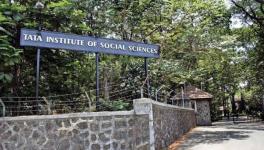DU: Uproar in AC Meeting Over UGC Nod to Graded Autonomy, Fee Hike in New Courses
New Delhi: The meeting of the Academic Council (AC) in Delhi University saw an uproar on Friday on category-I autonomy status granted to it by University Grants Commission (UGC) and the steep fee hike in new courses.
The opposition came from elected members of the Democratic Teachers Front and Academics for Action and Development Teachers Association (AADTA) as well as individual members who submitted a dissent note saying that the proposal for category-I autonomy status was never discussed in statutory bodies like the AC and Executive Council, and the steep rise in fee in new courses under new regime.
The UGC, the regulator for higher education institutions in the country, in its 571th meeting on July 25, this year granted Delhi University Category-I status under UGC Categorisation of Universities (only) for Grant of Graded Autonomy Regulations, 2018.
According to sources, in its letter dated August 11, to the Vice Chancellor, Delhi University, Yogesh Singh, UGC Secretary Manish Joshi said: “The commission has approved category-I university status to University of Delhi in accordance with provisions of mentioned UGC regulations. The university shall now be eligible for all the benefits stipulated under clause 4 of UGC Categorisation of Universities (only) for grant of graded autonomy regulations, 2018.”
The regulations maintain that Delhi University shall be a Category-I institution if it has been accredited by NAAC with a score of 3.51 or above; or it has received a corresponding accreditation grade/score from a reputed accreditation agency empanelled by the UGC; or It has been ranked among top 500 of reputed world rankings, such as Times Higher Education or QS.
However, some teachers feel that the problematic part of the regulations remain with the funding responsibility. The graded autonomy status means that the universities cannot ask for funding for running new courses, departments and centres. As per the regulations: “Universities may start a new course/programme/department/school/centre in disciplines that form a part of its existing academic framework without approval of the UGC, provided no demand for funds is made from the government on account of starting the new course/programme/department/school/ centre.”
It further adds, “Universities may open constituent units/off-campus centres within its geographical jurisdiction, without the approval of the UGC, provided it is able to arrange both recurring and non-recurring revenue sources and does not need any assistance for the same from the UGC or the government.”
The universities may also be able to hire foreign faculty, enter into collaboration with foreign universities for research and admit foreign students too.
Opposing the move, at least 10 elected members of the AC have submitted a dissent note on graded autonomy and said that “But for all these “freedoms” granted, there shall be no financial support provided by the government.”
The note (seen by NewsClick) added: “The University will have to generate its own funds. The Regulation aims at pushing the expense of expansion on the shoulders of students and parents. Operationalisation of this “autonomy” would mean that all courses hence forth will be in self-financing mode and employees, both teaching and non-teaching, hired for these new courses/departments etc will be on contract basis (experience of existing self-financing courses in DU and in all other HEIs).”
It further read, “University of Delhi is known for affordable education. This is a major blow to the idea of inclusion and education for all. The Regulation will starve the University unless it incorporates the running cost of new programmes/courses/departments into student fees. We dissent on the agenda item as it stands against the idea of inclusion and affordable education. It stands against the very idea of University of Delhi and public funded education.”
The agenda items maintain that the new fee of five-year Integrated BA LLB programme has been fixed at Rs 1.90 lakh per annum. Students whose parents’ income is less than Rs 4 lakh per annum may avail concession up to 90%. Students with family income from Rs 4 lakh to Rs 8 lakh per annum may avail 50% concessions. Similarly, new B. Tech courses will cost Rs 1 lakh per annum.
The dissent note also speaks of agenda 9.02 regarding teacher-student ratio in all the programmes/courses being offered by the university and its college, both at the under-graduate and post-graduate level, including management courses for classroom size. The university recently introduced new workload norms which suggested that the tutorial class would not be less than 20 students and regular classes of 60 students.
The letter signed by Mithuraj Dhusiya, Biswajit Mohanty among others said: “Instead of seeking grants for the additional demand of the fourth year of the UGCF on institutes in terms of infrastructure and staff, these notifications, in an artificial manner, are declaring teachers as surplus and by increasing volume of work, they are forcing teachers to take more load. These notifications are unacademic and adverse for teaching-learning, students and staff. Student-teacher ratio is an important pointer to maintain quality of teaching. The DU notification of 11.11.2022 arbitrarily increased tutorial size to 30 and practical size to 25, whereas LOCF and all earlier systems followed the tut size of 10-12 and practical size of 12-15. The notification of 28.7.2023 does not restore the old norms.”
It added: “The Notification of 28.7.2023 stipulates that the minimum number of students for any course will be 20. This number is extremely steep and smaller departments will suffer. Colleges had earlier used a minimum of 10 or 15 for optional papers. Colleges should be allowed flexibility on the matter. To maintain quality, only the upper limits should be stipulated. The Notification stipulates that for VAC and SEC, the practical size should be the same as class size. What skills can be developed if hands-on experiments have to be taught in class format? The whole idea of practical mode stands eroded if it is reduced to demonstration! If NEP is about skill enhancement, then practicals for SEC/VAC should have parity with other courses.”
Monami Sinha, AC member, who teaches economics at Kamla Nehru College, also objected to the new economics curriculum that has done away with important topics like the ‘economics of discrimination’. Sinha and some other teachers maintained that the new list of readings was not discussed with teachers of the departments and follows a “dangerous precedent”.
“We were informed by the department head that the syllabus was final as the committee constituted by VC is revisiting the syllabus. No time was given to AC members to look at the list even when it was introduced to us after much insistence,” she told NewsClick.
Get the latest reports & analysis with people's perspective on Protests, movements & deep analytical videos, discussions of the current affairs in your Telegram app. Subscribe to NewsClick's Telegram channel & get Real-Time updates on stories, as they get published on our website.
























